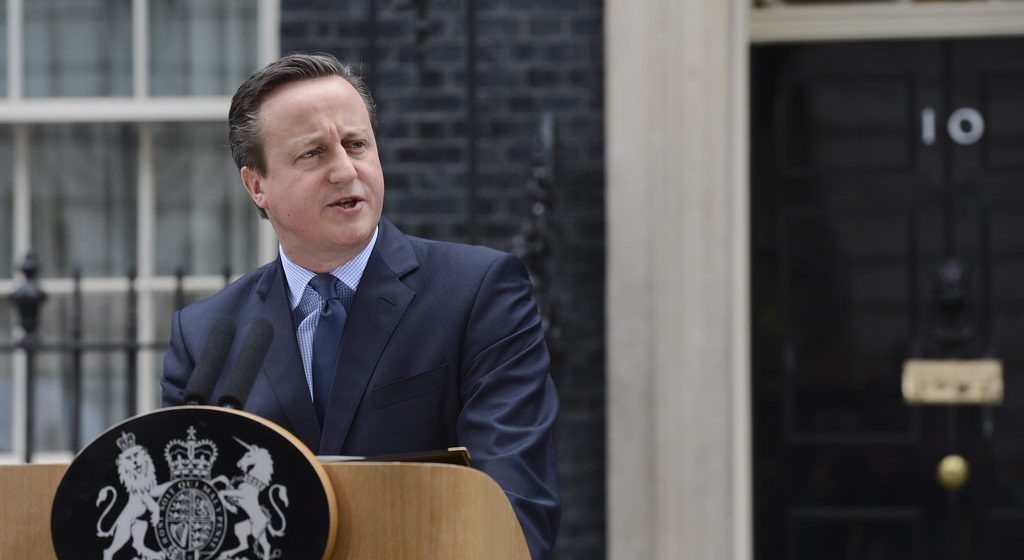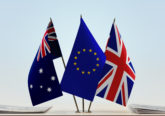The consequences of the Brexit referendum are bad for both Europe and Britain, regardless of the result.
The EU referendum in the United Kingdom was intended as a festival of democracy, but it has proved to be an exercise in political madness. Brits pride themselves on being sensible and pragmatic people, but they embarked on a sentimental journey into the unknown. Rational arguments are being set aside while populists are having a party. The prospect of a referendum with an uncertain result has already caused a great deal of disarray, and those who count the costs of a possible Brexit should realise that major damage to Europe and the United Kingdom has already been done.
A few million partisan national voters can dictate the course of a European plane with 500 million passengers on board.
David Cameron initially called the EU referendum to appease Eurosceptics within his own party, but the result has been perverse. The Tories are now divided more than ever, Cameron may lose his job, and Great Britain may lose Scotland. The essence of Cameron’s argument for a YES vote is perverse too: let’s stay in the EU because we are not part of meaningful integrative endeavours such as the Euro or Schengen. Perverse is also the argument of Jeremy Corbyn’s Labour: the EU is bad, but voting NO will help Michael Gove and Boris Johnson to convert Britain into a “neoliberal fantasy island”. With British friends like this the EU has bright prospects.
There is no evidence suggesting that the deal Cameron negotiated with the EU has satisfied many undecided British voters, but there is evidence suggesting that numerous European politicians are happy to follow the UK example and demand from the EU their own list of opt-outs and special arrangements. Shall we ban benefits of Polish workers in Austria? Should Poland accept the EU’s interference in its constitutional crisis? Why should Italy put up with budgetary restrictions demanded by Brussels? I have heard these questions openly debated in countries I visited in recent months. Everything seems up for grabs at present and Brussels is seen as a lame duck.
The tyranny of minorities
Since Cameron promised the EU referendum, numerous other countries have also decided to let their citizens vote on European matters. Several months ago we had a referendum asking Greek citizens to pass a judgment on a deal negotiated by their government with European creditors. In April a referendum was held in Holland on whether the association agreement between the EU and Ukraine ought to be ratified. Hungary has also announced a referendum on whether to accept mandatory EU quotas for relocating migrants.
In all these referenda only a fraction of the European electorate is able to cast a vote on matters concerning Europe as a whole. In other words, a few million partisan national voters can dictate the course of a European plane with 500 million passengers on board. Is this not a ‘tyranny of the minority’? I have always sided with the Greek hardship, but I don’t think Greeks should vote on what to do with German, Finnish, or Austrian money. The Dutch had their ‘democratic’ say on the future of Europe’s relations with Ukraine, but the implications of their vote will be shouldered by states such as Hungary or Poland. And should we entrust Brits in deciding the future of the European project? Some may give an affirmative answer. The problem is that the race between the YES and NO camp is close and so the outcome may be decided by such factors as the weather on 23 June. And the weather in Britain can be capricious as we know. “God save Europe”, one can paraphrase the British anthem.
When Cameron offered the referendum some of my British colleagues rejoiced: we will finally have a serious debate in this country about Europe and our role in it. Now we know how serious a debate it is. Spin and smear are everywhere. We are bombarded by hastily manufactured numbers (statistical data) telling opposite stories regarding migratory and economic prospects. Complex European arrangements are being presented as either good or bad. And the leaders of the opposite camps are engaged in vicious if not grotesque fear campaigns. One of them says that the victory of the NO camp will cause war, and the other that the victory of the YES camp will lead to a super-state designed by Adolf Hitler. So much for the enlightened democratic discourse of two adult Oxford graduates.
The province of populists
All this could have easily been predicted because referenda are, by their nature, the heyday of populists. A referendum creates a conflict-maximising mechanism that makes it impossible to arrive at decisions in a consensual, rational manner. A referendum forces politicians to present complicated issues in simplistic black and white terms, which obviously rewards populist politics and demagoguery. A referendum is a zero-sum game of winner takes all, no matter how tiny the count is between the winners and losers.
A referendum creates a conflict-maximising mechanism that makes it impossible to arrive at decisions in a consensual, rational manner.
I do wonder what the history books will write about the person who called this referendum. However, blaming only Cameron for this sorry state of affairs would be unfair. The EU has never put in place any genuine democratic means to make people feel that their voices count in European affairs. For several decades we were made to believe that democracy in Europe can be secured by the European Parliament. The European Parliament has been given more powers by successive treaties, but less and less Europeans have bothered to vote in European elections. Moreover, each of these elections have given a mandate to an ever larger group of Euro-sceptic politicians.
After the last European elections, a triumphant Marine Le Pen told cheering supporters at the Front National party headquarters in Paris: “the people have spoken loud and clear. They no longer want to be led by those outside our borders, by EU commissioners and technocrats who are unelected”. The response of Europe’s mainstream politicians was benign neglect and they continued with business as usual. They even elected a symbol of Europe’s ancient regime, Jean-Claude Juncker, as the European Commission President.
Juncker’s fingerprints are on everything that went wrong in the EU over the past three decades, from the heavy-handed handling of the Euro crisis to the light-handed handling of tax evasion. To make it more absurd Brussels called the selection of Jean-Claude Juncker a “triumph of democracy.” This was because Juncker was the so-called Spitzenkandidat selected by the centre-right coalition in the European Parliament. But was there any evidence suggesting that during the 2014 elections people voted strategically for certain parties in order to get Jean-Claude Juncker as the Commission president? For instance, Italians would have to vote Silvio Berlusconi in order to support Juncker. This sounds rather bizarre to any left-wing friends of European integration.
In the EU, technocrats dominate policy-making while populists dominate politics. Unless there are some meaningful channels of pan-European public deliberation and bargaining the EU will struggle to enjoy legitimacy, and national zealots will continue tearing Europe apart. One thing is certain: the EU referendum in Great Britain is a step in a wrong direction, no matter what the result.
This article was originally published at openDemocracy.





